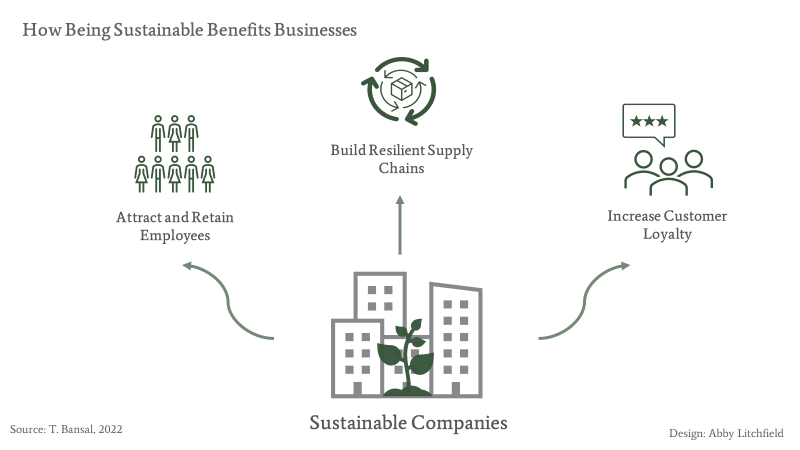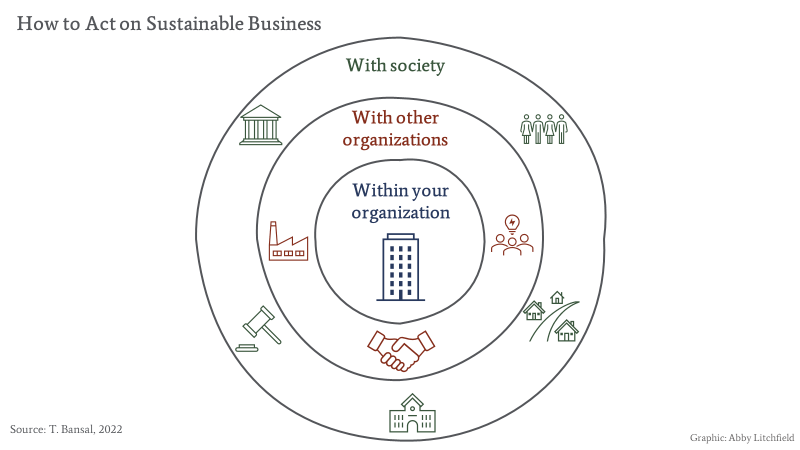Business sustainability is not CSR, the triple bottom line, or shared value. It’s bigger, more systemic, and more long term.
Dr. Tima Bansal is Founder of the Network for Business Sustainability.
I am often asked, “what do you mean by business sustainability?” Everyone asks — business leaders, students, even my academic colleagues who study sustainability.
Business sustainability comes from sustainable development
In 1987, the United Nations coined the term sustainable development. They said economic development that is ‘sustainable’ meets “the needs of present generations without compromising the needs of future generations.”
So, business sustainability means that businesses should create wealth and make people’s lives better. But, they need to do so without compromising the health and wealth of future generations. That means businesses should not consume natural resources too quickly (e.g., overfishing) or create waste like plastic and carbon too quickly. The long-term goal is thriving societies and ecosystems.
No single business can be sustainable – only groups of organizations. Every individual business consumes resources and creates waste. By working with other organizations, a business can use another organization’s waste as inputs for its own production processes and sell its waste for others’ production processes – for example, a grocery store’s leftover fruit becoming a juice bar’s inputs.
This reuse is often called the circular economy, and I see it as our best pathway for business sustainability. Not only does this reduce natural resource extraction, it reduces waste generation. And to make it even more attractive, if done right, it generates economic value.
Ambitious? Yes. Impossible? No.
Business sustainability is the only way to assure future prosperity for all. We need to figure it out.
Why business sustainability is so confusing
I think part of the reason that people get stumped on the definition of business sustainability is because the word ‘sustainability’ is also used to describe pure business strategy ideas, such as sustainable competitive advantage and sustained growth. But, ‘sustainable’ used in these ways simply means sustained, or lasting. ‘Sustainable’ in strategy concepts has little to do with society – it’s only about business.
Yet, that is not the only source — or even the main source — of confusion. People working on social and environmental issues use a lot of concepts to describe their efforts at the intersection of business and society. They use terms like corporate social responsibility (CSR), shared value, the triple bottom line, or just managing environmental impacts.
However, these other concepts can differ from sustainability in important ways. Here’s what they mean and where they fall short.
Corporate social responsibility
CSR emphasizes the corporation’s ethical responsibilities. It focuses on the word ‘responsibility’. In my mind, this expression is problematic, as it’s not clear to whom corporations should feel responsible. Responsible to shareholders, customers, citizens, or future generations?
This is where things become messy, as each responsibility leads to a different set of decisions and actions. Responsibility to one stakeholder can even contradict action needed to show responsibility to another stakeholder. Additionally, some executives use the law to guide responsible practices; others feel they need to go beyond the law.
Basically, there’s little consensus. For some companies, responsibility is offering the minimum wage to satisfy shareholders; for others, responsibility is offering a higher living wage to satisfy employees. How does one draw the line on CSR?
Shared value
Shared value argues that companies can generate value for the firm and society simultaneously. But something is missing — shared value does not emphasize the importance of time and future generations, both key to sustainable development.
The biggest opportunities for shared value can take a long time to create. But because many businesses are increasingly short term, they can’t see very far into the future to create that long-term value. They most often seek immediate win-wins, such as saving costs related to energy or water use. They don’t consider the impact on future generations.
For example: Nike creates shared value through its woven FlyKnit, because the product created fewer wasteful offcuts and a cheaper shoe for consumers. Yet, if Nike ends up selling more shoes, then the impact on future generations is arguably worse, because of greater resource use and shoes discarded at the end of their life.
Triple bottom line
The triple bottom line is also distinct from sustainability. It simply requires businesses to consider three ‘bottom lines’ – social, environmental, and financial performance. This approach does not offer guidance on how to manage those bottom lines or make difficult trade-offs.
Should Nike sell more sneakers (more profits) or fewer sneakers (smaller environmental footprint)? How should Shell Oil decide between providing more energy to meet people’s needs (and generating profits) and drilling in the sensitive Arctic ecosystem?
Focus on meaning, not words
Often different concepts are mixed together. For example, when Shell Oil describes sustainability, they introduce elements of responsibility and the triple bottom line: “Sustainability at Shell means providing energy in a responsible manner, respecting people, their safety and the environment.”
If you’re unsure about which concept to use, don’t worry. Most people will figure out what you mean by the actions you take. It’s more about what you do than the label you use.
Why business sustainability is important
There are lots of reasons why businesses should care about sustainability. First and foremost is that there is no future for humankind (or even business) if businesses extract all the resources and pollute the planet.
But, it’s also worth noting that businesses that think about the future and their wider impacts on society and the planet see real benefits. These include:
attracting and retaining employees, especially in a world where people are seeking more purpose in their work
building more resilient supply chains, as they experience fewer disruptions in supply
building a more loyal customer base, as an increasingly growing number of consumers seek products and experiences offered by companies that are attuned to their wider impacts.
There is also growing evidence that these companies perform better in the long term. The biggest challenge is that there are so many distractions, including shareholder pressures for short-term results, that businesses can lose sight of sustainability.

Examples of business sustainability
What does business sustainability look like in practice? We’re talking about a long-term perspective, with concern for future generations; and collaboration, where businesses and other organizations work together to protect a system.
Here are some examples I’ve seen.
Considering indigenous worldviews in phone service
Indigenous worldviews are known for taking a holistic view, emphasizing connections with land and community. I recently organized a workshop with Melanie Goodchild, co-founder of indigenous “think and do tank” the Turtle Island Institute. Participants were asked to put themselves in the shoes of Cisco executives, providing wireless infrastructure to Indigenous peoples on Tribal Land in California.
The initiative’s success needed to be defined by the community, not Cisco, Goodchild explained. For the community, wireless services should support, not erode, the culture, the relationship to land, and language. Find out more.
Building a circular food economy
Guelph, Canada, hosts “Our Food Future,” a project for food production, distribution, and consumption. The goal is nutritional food with minimal waste, and it rests on countless collaborations. Those involved include project includes urban and vertical farmers, a pay-what-you-can grocery-delivery service, and a social-finance fund to help food businesses get off the ground. And, if you want to learn more about the circular economy in general, here’s a link to an evidence-based report out of Canada: “Turning Point.”
Asking the right questions
As an educator, I’m never happier than when talking to my students; future business professionals. And increasingly, the questions they’re asking give me hope for the future. Many of today’s business students question why the primary goal of business is profits. They are asking how they can change the system for public good. I’m excited about working with them to find the answer. Find out more.
How to act on sustainable business
I recognize that business sustainability is not as simple as concepts like revenues, costs or profits. It requires executives to see themselves as part of a larger organizational, social and ecological system. And, that type of complexity can feel overwhelming.
I also acknowledge that it will be some time before we shift the short-term business logic to incorporate the implications for future generations.
However, there has been a sea change towards sustainability, as the senior executives of large corporations see the impending disasters related to climate change and biodiversity loss. More than ever before, companies are recognizing that business as usual is not an option.
In the last 2 years, companies are not only committing to net zero targets, they are also recognizing that they need to replace shareholder capitalism with stakeholder capitalism.
The trick is to take things a step at a time, and here is some tangible advice.
You can think about sustainable business activities as occurring at three levels. We’ve curated our most actionable resources to help you get started at any level.

Continuing the conversation
I would appreciate hearing your reaction to the ongoing question of ‘what is business sustainability’. Please feel free to message me (@TimaBansal) or the NBS community (@NBSnet) privately or publicly.
About the “Basics of Business Sustainability”
“The Basics” series provides essential knowledge about core business sustainability topics. All articles are written or reviewed by an expert in the field. The Network for Business Sustainability builds these articles for business leaders thinking ahead.



Add a Comment
This site uses User Verification plugin to reduce spam. See how your comment data is processed.Sustainability is a business approach to creating long-term value by taking into consideration how a given organization operates. I was reading this article https://tejkohli.co.uk/sustainable-business-long-term-impact and I think a sustainable business model is very important for our future.
This site uses User Verification plugin to reduce spam. See how your comment data is processed.